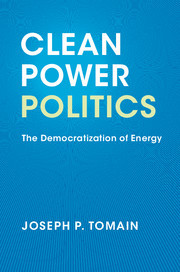Description
Clean Power Politics
The Democratization of Energy
Author: Tomain Joseph P.
Clean Power Politics explains clean energy policy and the need for a successful transition to clean energy in the future.
Language: English
Subject for Clean Power Politics:
Approximative price 32.87 €
In Print (Delivery period: 14 days).
Add to cart
Clean Power Politics
Publication date: 03-2017
288 p. · 15.2x22.9 cm · Paperback
Publication date: 03-2017
288 p. · 15.2x22.9 cm · Paperback
Approximative price 94.05 €
In Print (Delivery period: 14 days).
Add to cart
Clean Power Politics
Publication date: 02-2017
288 p. · 15.7x23.5 cm · Hardback
Publication date: 02-2017
288 p. · 15.7x23.5 cm · Hardback
Description
/li>Contents
/li>Biography
/li>
The United States has been experiencing an energy transition for over four decades, and now - thanks to the Clean Power Plan of the Obama Administration and the Paris climate agreement - a clean energy future is moving closer to reality. In Clean Power Politics, Joseph Tomain describes how clean energy policies have been developed and, more importantly, what's necessary for a successful transition to a clean energy future, including technological innovation, new business models, and regulatory reforms. The energy system of the future will minimize the environmental costs of traditional energy production and consumption, and emphasize expanded use of natural resources and energy efficiency. Because many new energy technologies can be produced and consumed at smaller scales, they will shift decision-making power away from traditional utilities and empower consumers to make energy choices about consumption and price. In this way, a clean energy future embodies a democratization of energy.
Introduction; Part I. Preconditions for a Clean Power Transition: 1. The clean power plan and clean power politics; 2. Defining and measuring clean power; 3. The political economy of clean power; Part II. The Necessity of Innovation: 4. Innovation policy and institutions; 5. Clean power systems; 6. Regulatory innovation; Part III. The Democratization of Energy: 7. Energy and democracy.
Joseph P. Tomain has been teaching and writing in the field of energy law since 1977. He has published numerous articles, essays, casebooks, treatises, and monographs on energy law and has delivered papers at conferences throughout the US and Europe. Tomain is actively involved with energy organizations, including the Center for Progressive Reform and the PUC Collaborative.
© 2024 LAVOISIER S.A.S.

